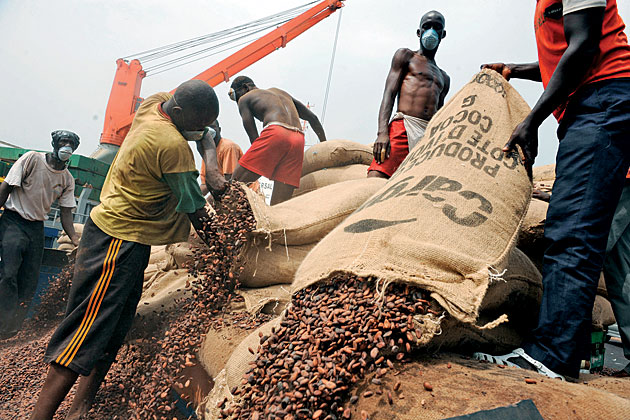
The Majority New Patriotic Party (NPP) Caucus in Parliament says under no circumstances can the government increase the price of cocoa for the 2017/2018 crop season in view of the sharp drop in price of the commodity on the world market.
The price of cocoa on the world market has fallen drastically from US$3,122 per tonne in June 2016 to US$1,900 per tonne in June 2017.
According to the Majority NPP MPs, the sharp drop in the price of cocoa on the world market meant that there is already a price loss of over GH₵1 billion on the local market, a situation they noted would be catered for by the Stabilization Fund.
That aside, the debt of GH₵10 billion handing on the neck of COCOBOD further makes it impossible for the government to increase the price of the commodity as being championed by the Minority National Democratic Congress (NDC) Members of Parliament.
They further announced the government’s resolve to go ahead with the sale of fertilizer to cocoa farmers which has already been subsidized by about 50% despite the cacophony of the opposition NDC MPs.
The Minority NDC MPs on Wednesday, June 22, 2017, accused the government of cheating the Ghanaian cocoa farmer by asking him or her to fertilizer (s) which has already been paid for the previous government.
According to them, the Mahama-led administration prior to the determination of the producer price of cocoa for the 2016/2017 made provision for the purchase of 2.2 million bags of granular fertilizer and 1.6 million litres of liquid fertilizer to fertilize over 1 million hectares of cocoa farms free of charge.
Therefore, it baffles their imagination why the government will turn around to sell the already paid for fertilizer to the Ghanaian cocoa farmer.
They had also argued that despite the drop in the price of cocoa on the market, the Stabilization Fund was meant to address the shortfalls and ensure an increase in the price of the commodity to local farmers.
A bag of the granular fertilizer is selling at GH₵80.00 while that of the liquid fertilizer is being sold at GH₵20.00 on the local market.
But addressing a news conference in Accra on Friday over the issue, the Majority NPP MPs said the decision taken by the government is meant to safeguard the interest of the cocoa farmer to ensure optimal production for the 2017/2018 crop season.
Acting Chairman of the Committee on Food, Agriculture and Cocoa Affairs, Hon. Kwame Asafo-Adjei, who addressed the news conference, told journalists it is not out of place for COCOBOD to embark on such measures in the 2017/2018 crop season to avoid a total collapse of the cocoa sector and to sustain cocoa farmer’s interest in the country.
“The producer price of GH₵7,600.00 per tonne of cocoa announced at the beginning of the 2016/2017 crop season has not, and will not be reviewed downwards as being speculated, despite the fall in the world price of cocoa. Even though such conditions which saw 40% fall in the world market price of cocoa have the potential to cause a reduction in the producer price, as being done in neighbouring Cote d’Ivoire, Nigeria and Cameroon, the government has decided to absorb the loss and by this arrangement, cocoa farmers are being paid extra US$400 above what the market prescribes for every tonne of cocoa bought from them,” he noted.
A deputy Minister of Food and Agriculture, William Agyapong Quaittoo, also commenting on the issue said the decision by the government to sell fertilizer to the cocoa farmer is to eliminate corruption which characterized the free distribution of the product.
“The free fertilizer policy created enormous avenues for corruption. Farmers complained of inadequate supply as well as diversion of the inputs. On paper, huge quantities of fertilizer were purchased but most cocoa farmer were actually not fertilized and this is one of the major reasons why cocoa production never exceeded the 700,000 metric tonnes range. It is therefore, in response to these negative factors and the several requests and recommendations from farmers that the NPP Government decided to re-introduce the fertilizer subsidy programme. In this way, the budgeted amount to support cocoa farmers is equitably distributed to all farmers. The subsidy provided is almost 50%. The Minority NDC will be surprised to know that the very farmers they seem to be crying for have overwhelmingly embraced the programme,” he posited.



